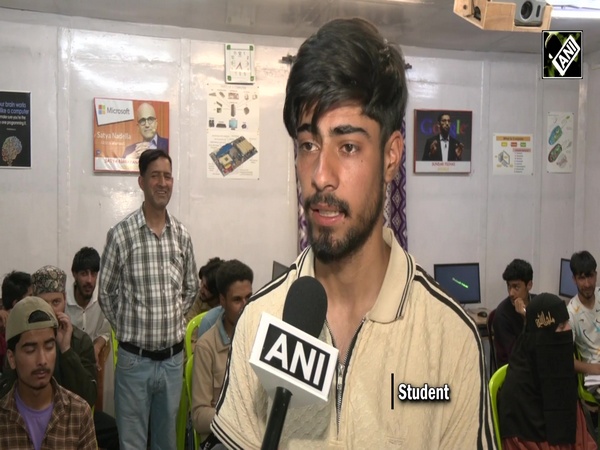Same-sex marriage: Telangana Markazi Shia Ulema Council in SC opposes pleas seeking marriage equality
Apr 10, 2023

New Delhi [India], April 10 : Telangana Markazi Shia Ulema Council on Monday opposed the various petitions seeking marriage equality and submitted before the Supreme Court that the idea of legal recognition of same-sex marriages is exclusively Western and entirely unsuited to the social fabric of India.
Telangana Markazi Shia Ulema Council has moved an intervening application in the Supreme Court in various petitions seeking legal recognition of same-sex marriages.
Telangana Markazi Shia Ulema Council has urged the top court to allow it to be impleaded as party respondents in the matter.
Telangana Markazi Shia Ulema Council is a religious and spiritual organization whose main aims and objectives include the dissemination of spiritual knowledge, establishing educational institutions and helping orphans and the destitute.
Pursuant to its objective of spreading spiritual knowledge, the organization regularly organise conferences in honour of Hazrat Imam Hussain (Peace Be Upon Him), the grandson of the Prophet of Islam (Peace Be Upon Him) and organizes religious gatherings (majalis) on a regular basis. The organisation is a Muslim body belonging to the Shiite denomination, that works to disseminate the lofty values of the religion of Islam.
Telangana Markazi Shia Ulema Council said that the idea of same-sex marriage is in the teeth of the injunctions of the Islamic faith. The same holds great significance in view of the fact that marriage in Indian society has deep roots in religion and therefore, religious prohibitions on same-sex marriage ought to be considered while examining the question of the legal validity of same-sex marriages.
The applicants submitted that various academic works show that children raised by homosexual parents lag behind children raised by heterosexual couples in most areas of human development.
Telangana Markazi Shia Ulema Council submitted that in the vast majority of countries in the Global South, same-sex couples do not have the right to marry.
As the averments of the petitioners show, most of the countries which have legalised same-sex marriage belong to the Global North, the Council said.
Telangana Markazi Shia Ulema Council submitted that the idea of legitimising same-sex marriages is exclusively Western and entirely unsuited to the social fabric of India. In the West/Global North, religion has largely ceased to be a source of law and plays very little role in public life.
On the other hand, religion plays an instrumental role in shaping personal law, along with social norms and family ties in India and mainstream religions (including Islam) practised in India are entirely opposed to homosexuality and same-sex marriages, the council said.
The council further added that the question of marriage is intertwined with religion and personal law and therefore, it is humbly submitted that critical religious perspectives on homosexual marriages may be taken into consideration in the adjudication of the present proceedings.
Earlier, Jamiat Ulama-I-Hind moved an intervening application in Supreme Court in the matter pertaining to the legal recognition of same-sex marriage, saying that as per the legal regime in the country, marriage is only between a biological man and a biological woman. Jamiat Ulama-I-Hind has supported the submission of the Centre on this issue.
The centre, in its affidavit filed earlier, had opposed the plea seeking legal recognition of same-sex marriage, saying that living together as partners by same-sex individuals, which is decriminalised now, is not comparable with the Indian family unit and they are clearly distinct classes which cannot be treated identically.
Same-sex relationships and heterosexual relationships are clearly distinct classes which cannot be treated identically, the government said as its stand against the petition seeking legal recognition of LGBTQ marriage.
It is for the legislature to judge and enforce such societal morality and public acceptance based upon Indian ethos, the centre said in its affidavit and added that Western decisions sans any basis in Indian constitutional law jurisprudence, cannot be imported in this context.
In the affidavit, the centre apprised the apex court that living together as partners by same-sex individuals, which is decriminalised now, is not comparable with the Indian family unit concept of a husband, a wife and children.
On March 13, the Supreme Court referred the matter relating to the legal recognition of same-sex marriage to a five-judge Constitutional Bench.
Various petitions are being dealt with by Supreme Court seeking legal recognition of same-sex marriage under the Foreign Marriage Act, Special Marriage Act and other laws.
One of the petitions earlier raised the absence of a legal framework which allowed members of the LGBTQ+ community to marry any person of their choice.
According to the earlier petition, the couple sought to enforce the fundamental rights of LGBTQ+ individuals to marry any person of their choice and said that "the exercise of which ought to be insulated from the disdain of legislative and popular majorities."
The petitioners, further, asserted their fundamental right to marry each other and prayed for appropriate directions from this Court allowing and enabling them to do so.

















